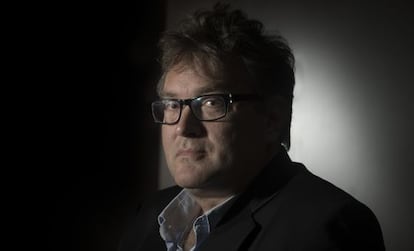Jon Matonis: “The bitcoin will survive”
Economist’s mission is to bring prestige back to currency and convince authorities that it is valid

Jon Matonis has gone over to the other side. He used to work for Visa, but now he heads the Bitcoin Foundation, which brings together most operators who use this virtual currency.
The bitcoin is a constant source of news stories, and most of them are negative, from the arrest of vice-president Charlie Shrem over a website that used bitcoins to sell drugs, to the shutdown of Mt. Gox, the bitcoin exchange, which has trapped thousands of investors in a “corralito” of sorts after customer withdrawals were suspended due to a technical glitch. And then there are the inexplicable news, such as the fact that the bitcoin's value rose from 12 to 1,000 euros in just a year, and is now back down to 300 euros.
Matonis, an economist and computer engineer from Philadelphia, has a mission: to bring prestige back to the bitcoin and convince authorities that it is a valid currency.
In any case, the bitcoins - which are five years old now - are worth seven billion dollars, half as much as last December. Every day, 58,000 transactions are conducted with bitcoins (in December the average was 102,000).
Matonis was present at the Mobile World Congress, where this interview was conducted.
Question. Why did you leave Visa for Bitcoin?
Answer. It's been an interesting evolution. I was in charge of currencies at Visa. Later I worked in Silicon Valley, at Verisign, which works in encryption. I never thought both things would come together, finance and cryptography. Curiously, in the late 1990s Visa attempted to develop a virtual currency, but it never materialized.
Q. I have some savings. Do you recommend buying a home or buying bitcoins?
A. If you consider it a high-risk investment, I recommend bitcoins. You shouldn't invest what you can't afford to lose. But everyone is different and perceives risk in their own way; and maybe some people devote 10 percent of their savings to bitcoins while others invest 50 percent. There are investment groups that are starting to recommend this virtual currency for personal portfolios, together with bonds, shares, housing and gold. In the near future financial advisors will start recommending it, too.
Q. Why are there such constant fluctuations in the exchange rate? From 20 euros to 1,000 euros in a year, and down again.
A. The bitcoin is only five years old. It's still in an experimental phase, and that's why it's so volatile. It's like a baby that learning to walk, that's why the price changes so much.
Q. The main exchange, Mt. Gox, has shut down and nothing more is known about its bitcoin deposits. What happened?
A. It was an isolated incident. It is unrelated to the bitcoin protocol, and instead involves the way they managed the exchange, updated the [digital] wallets and failed to provide oversight of those wallets. I am worried about the people who had money there.
Q. But these incidents hurt the currency...
A. I am not worried about the currency. It is resilient. When the Mt. Gox story broke, the value dropped to 400 dollars, and in two days it rose again. The currency's ecosystem can deal with these shocks. The problem is people, because, the bitcoin being independent, without a central authority, if they lose the currency they lose the money. No government or bank is going to come bail them out.
Tu suscripción se está usando en otro dispositivo
¿Quieres añadir otro usuario a tu suscripción?
Si continúas leyendo en este dispositivo, no se podrá leer en el otro.
FlechaTu suscripción se está usando en otro dispositivo y solo puedes acceder a EL PAÍS desde un dispositivo a la vez.
Si quieres compartir tu cuenta, cambia tu suscripción a la modalidad Premium, así podrás añadir otro usuario. Cada uno accederá con su propia cuenta de email, lo que os permitirá personalizar vuestra experiencia en EL PAÍS.
¿Tienes una suscripción de empresa? Accede aquí para contratar más cuentas.
En el caso de no saber quién está usando tu cuenta, te recomendamos cambiar tu contraseña aquí.
Si decides continuar compartiendo tu cuenta, este mensaje se mostrará en tu dispositivo y en el de la otra persona que está usando tu cuenta de forma indefinida, afectando a tu experiencia de lectura. Puedes consultar aquí los términos y condiciones de la suscripción digital.








































